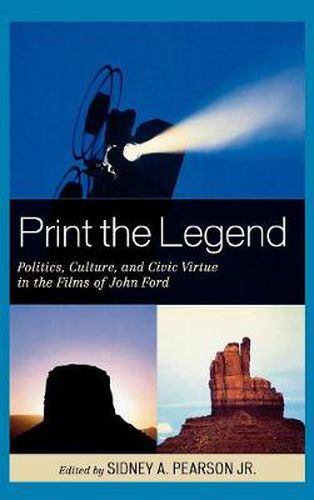Readings Newsletter
Become a Readings Member to make your shopping experience even easier.
Sign in or sign up for free!
You’re not far away from qualifying for FREE standard shipping within Australia
You’ve qualified for FREE standard shipping within Australia
The cart is loading…






In Print the Legend: Politics, Culture, and Civic Virtue in the Films of John Ford, a collection of writers explore Ford’s view of politics, popular culture, and civic virtue in some of his best films: Drums Along the Mohawk, The Searchers, The Man Who Shot Liberty Valance, Stagecoach, How Green Was My Valley, and The Last Hurrah. John Ford, more than most motion picture directors, invites his viewers into a serious discussion of these themes. For instance, one can consider Plato’s timeless question ‘What is justice?’ in The Man Who Shot Liberty Valance, vengeance as classical Greek tragedy in The Searchers, or ethnic politics in The Last Hurrah. Ford’s films never grow stale or seem dated because he continually probes the most important questions of our civic culture: what must we do to survive, prosper, pursue happiness, and retain our common decency as a regime? Further, viewing them from a distance of time, we are subtly invited to ask whether anything has been lost or gained since Ford celebrated the civic virtues of an earlier America. Is Ford’s America an idealized America or a lost America?
$9.00 standard shipping within Australia
FREE standard shipping within Australia for orders over $100.00
Express & International shipping calculated at checkout
In Print the Legend: Politics, Culture, and Civic Virtue in the Films of John Ford, a collection of writers explore Ford’s view of politics, popular culture, and civic virtue in some of his best films: Drums Along the Mohawk, The Searchers, The Man Who Shot Liberty Valance, Stagecoach, How Green Was My Valley, and The Last Hurrah. John Ford, more than most motion picture directors, invites his viewers into a serious discussion of these themes. For instance, one can consider Plato’s timeless question ‘What is justice?’ in The Man Who Shot Liberty Valance, vengeance as classical Greek tragedy in The Searchers, or ethnic politics in The Last Hurrah. Ford’s films never grow stale or seem dated because he continually probes the most important questions of our civic culture: what must we do to survive, prosper, pursue happiness, and retain our common decency as a regime? Further, viewing them from a distance of time, we are subtly invited to ask whether anything has been lost or gained since Ford celebrated the civic virtues of an earlier America. Is Ford’s America an idealized America or a lost America?